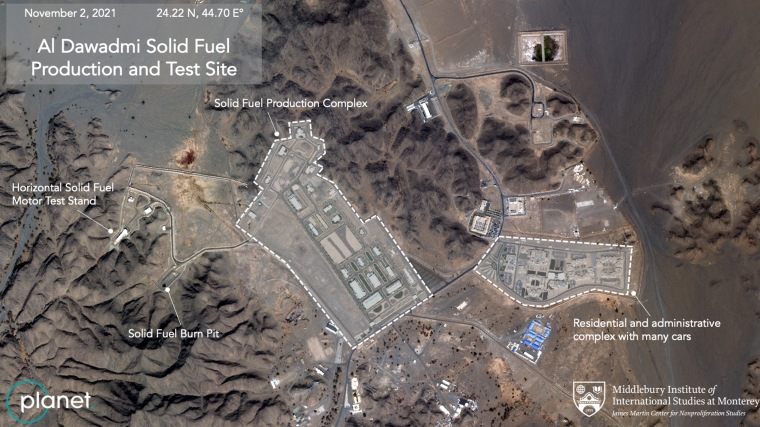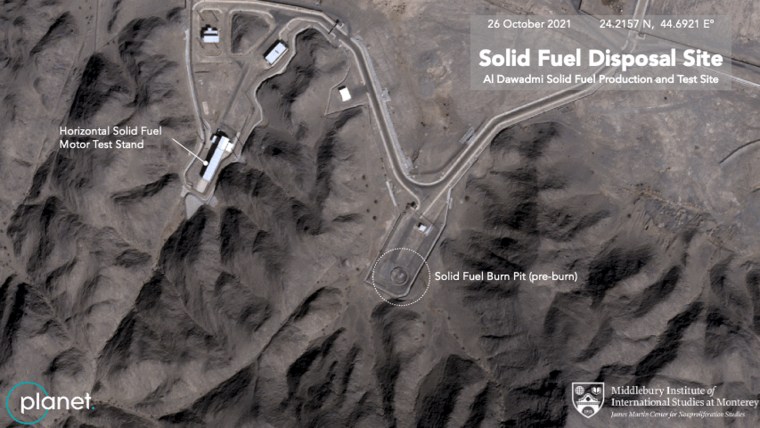
Saudi Arabia appears to be building its own ballistic missiles with China’s help
The development could shift security calculations in the Middle East and further complicate the Biden administration’s efforts to coax Iran back into its nuclear deal with world powers.
Satellite images from commercial imaging company Planet show the test site in Saudi Arabia on Nov. 2, 2021. Planet Labs PBCDec. 24, 2021, 12:36 PM MSTBy Courtney Kube and Saphora Smith
Saudi Arabia is building its own ballistic missiles with the help of China, according to United States intelligence assessments and satellite images.
The assessment of U.S. intelligence agencies is that the kingdom, which is long thought to have acquired missiles from Beijing, is now manufacturing its own, according to a source familiar with the matter and a U.S. official.
Satellite images obtained by NBC News also suggest that Saudi Arabia is producing ballistic missiles at a site west of the capital, Riyadh, according to researchers at the Middlebury Institute of International Studies at Monterey, in California.
“The key piece of evidence is that the facility is operating a ‘burn pit’ to dispose of solid-propellant leftover from the production of ballistic missiles,” wrote Jeffrey Lewis and David Schmerler of the James Martin Center for Nonproliferation Studies at the Middlebury Institute.
They added that the site “appears to have been constructed with Chinese assistance.”
The news was first reported by CNN on Thursday. The images were provided by commercial imaging company Planet Labs PBC.

The development could shift security calculations in the Middle East and further complicate the Biden administration’s efforts to coax Iran back into its nuclear deal with world powers. It could also add another layer of complexity to Washington’s relations with Beijing.
Iran and Saudi Arabia are regional foes and there will be concern that Riyadh’s manufacturing of ballistic missiles could alter Tehran’s calculations on its possible agreements in talks aimed at reviving the 2015 accord. The new development comes days before the talks, which have struggled to make any headway, are expected to resume in Vienna, and may make Iran even more unlikely to give up its own ballistic missiles.
“If Iran were to enter into negotiations over its missile programme, it would be unlikely to accept limits that did not also apply to other countries,” wrote Mark Fitzpatrick, an associate fellow at the London-based International Institute for Strategic Studies, in an article about Saudi Arabia’s ballistic missile program published by the institute in August.
Fitzpatrick, a former State Department official, said at the time that other than a general desire to keep pace with Iran, Riyadh’s motivations for acquiring ballistic missiles were not entirely clear. Unlike Tehran, however, Saudi Arabia is not known to have initiated any work to develop a nuclear warhead for its missiles, he added.
Ballistic missiles are rocket-propelled weapons that can carry conventional explosives as well as nuclear warheads.
Nevertheless, the fact that Saudi Arabia is now known to be manufacturing its own ballistic missiles will spark concerns of a ramped-up arms race in a highly tense region that is already riven with conflict.
The Saudi Ministry of Media did not respond to requests for comment.
Britain on Friday condemned a launch of ballistic missiles by Iran in war games conducted this week.
“These actions are a threat to regional and international security and we call on Iran to immediately cease its activities,” the Foreign Office said in a statement.
In 2018, former President Donald Trump withdrew the United States from the nuclear accord and re-imposed crippling sanctions on Iran. Tehran has since reduced its compliance with the deal, announcing that it would enrich uranium to up to 60 percent purity — significantly closer to the amount needed to make an atomic bomb.
In the past, Saudi Arabia’s de facto leader, Crown Prince Mohammed bin Salman, has been clear that if Tehran develops a nuclear bomb, Riyadh will also do so.
“Saudi Arabia does not want to acquire any nuclear bomb, but without a doubt if Iran developed a nuclear bomb, we will follow suit as soon as possible,” he told CBS in 2018.
The crown prince is attempting to transform Saudi Arabia from an oil-dependent nation into an economic powerhouse that is more accepted in the West.
The Saudis have long been U.S. allies and enjoyed a close relationship with the Trump administration, but those efforts to overhaul the country’s image were tainted by the murder of journalist Jamal Khashoggi in the Saudi consulate in Istanbul in 2018.
Meanwhile, the continued close military relationship between Saudi Arabia and China will also probably be of concern to the Biden administration as it tries to manage a complex and fraught relationship with Beijing, criticizing its human rights record while also cooperating with Chinese leaders on major global threats like climate change and the Covid-19 pandemic.
The White House did not immediately return a request for comment.
Asked to respond to these fresh indications it was aiding Saudi Arabia’s push to produce ballistic missiles, China said it has always opposed the proliferation of weapons of mass destruction and their means of delivery, and implements strict export controls on missiles and related technologies, according to a statement from its Ministry of Foreign Affairs.
“China and Saudi Arabia are comprehensive strategic partners,” the ministry said. “Such cooperation does not violate any international law and does not involve the proliferation of weapons of mass destruction.”
It added that Beijing has always opposed unilateral sanctions and “will continue to take necessary measures to resolutely safeguard its own rights and interests.”
Saudi Arabia has been known to have purchased missiles from China in the past but has never built its own, the source familiar with the matter and the U.S. official confirmed.
No comments:
Post a Comment